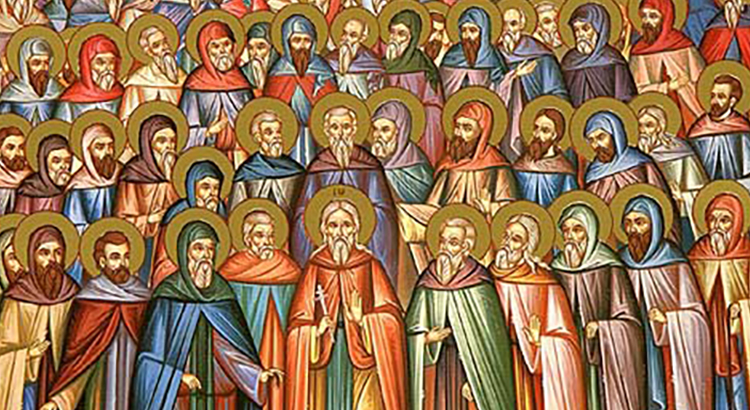Memory of the Saints and the Prophets
Reading of the Word of God
Alleluia, alleluia, alleluia
You are a chosen race,
a royal priesthood, a holy nation,
a people acquired by God
to proclaim his marvellous works.
Alleluia, alleluia, alleluia
Luke 19,11-28
While the people were listening to this he went on to tell a parable, because he was near Jerusalem and they thought that the kingdom of God was going to show itself then and there. Accordingly he said, 'A man of noble birth went to a distant country to be appointed king and then return. He summoned ten of his servants and gave them ten pounds, telling them, "Trade with these, until I get back." But his compatriots detested him and sent a delegation to follow him with this message, "We do not want this man to be our king." 'Now it happened that on his return, having received his appointment as king, he sent for those servants to whom he had given the money, to find out what profit each had made by trading. The first came in, "Sir," he said, "your one pound has brought in ten." He replied, "Well done, my good servant! Since you have proved yourself trustworthy in a very small thing, you shall have the government of ten cities." Then came the second, "Sir," he said, "your one pound has made five." To this one also he said, "And you shall be in charge of five cities." Next came the other, "Sir," he said, "here is your pound. I put it away safely wrapped up in a cloth because I was afraid of you; for you are an exacting man: you gather in what you have not laid out and reap what you have not sown." He said to him, "You wicked servant! Out of your own mouth I condemn you. So you knew that I was an exacting man, gathering in what I have not laid out and reaping what I have not sown? Then why did you not put my money in the bank? On my return I could have drawn it out with interest." And he said to those standing by, "Take the pound from him and give it to the man who has ten pounds." And they said to him, "But, sir, he has ten pounds . . ." "I tell you, to everyone who has will be given more; but anyone who has not will be deprived even of what he has. "As for my enemies who did not want me for their king, bring them here and execute them in my presence." ' When he had said this he went on ahead, going up to Jerusalem.
Alleluia, alleluia, alleluia
You will be holy,
because I am holy, thus says the Lord.
Alleluia, alleluia, alleluia
Surrounded by a large crowd, Jesus is at the end of his journey and about to enter Jerusalem. Some believe the time has come for the manifestation of the kingdom of God in the holy city. Most people expect it to be a political event. But Jesus wants to dispel any such illusion and tells a parable about how one should expect the kingdom of heaven. He therefore speaks of a noble man who leaves for a distant country to receive the royal dignity. Before he leaves, however, he entrusts ten servants with a golden coin each so that during his absence they can make it work for him. We can compare the master of the parable to Jesus himself. He entrusts his disciples with the very precious "golden coin" that is his Gospel. It is a priceless gift that is not to be kept for oneself, nor is it to be kept in one's own little or big "piece of cloth." The Gospel is handed over to the disciples so that they may communicate it to men and women wherever they are and, in this way, hasten and expand the reign of love and peace that Jesus came to inaugurate on earth among people. The master's gesture of giving the unfruitful talent to the first servant indicates the great desire that the Gospel be communicated to all and with the greatest possible solicitude. This is why Jesus says at the end of the parable: "To all those who have, more will be given; but from those who have nothing, even what they have will be taken away." It is not possible to follow Jesus without communicating the Gospel, without communicating love everywhere in the world. So it is with love: if we do not love we lose it.
